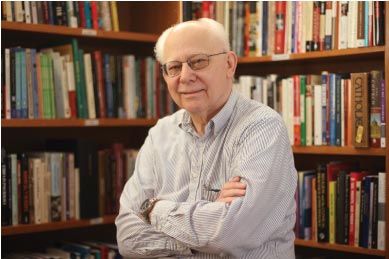 Paul Dokecki was born and raised in Brooklyn and came to Nashville in 1962, 10 days after his wedding to his wife, Katherine, to start a doctoral program in clinical psychology at Peabody. “The culture shock was significant at about every level,” he says.
Paul Dokecki was born and raised in Brooklyn and came to Nashville in 1962, 10 days after his wedding to his wife, Katherine, to start a doctoral program in clinical psychology at Peabody. “The culture shock was significant at about every level,” he says.
Forty-eight years later, Dokecki has spent almost his entire career at Peabody, returning in 1970 to become Susan Gray’s associate director for the Demonstration and Research Center for Early Education or DARCEE (see “7 Great Ideas”). Starting out as a student of Rue Cromwell and Julius Seeman and having Nicholas Hobbs as a mentor, Dokecki has witnessed the modern history of psychology and education at Peabody, from the child-centered reforms of Gray and Hobbs to the emergence of community psychology as a discipline and its subsequent interdisciplinary evolution into the doctoral program in Community Research and Action, for which Dokecki currently serves as director.
What he really planned to do when he came to campus in 1962 was become a clinical psychologist.
“I was going to be a headshrinker. I ended up not shrinking heads, but shrinking communities,” he laughs. “I thought I was going to have my career doing research on adult schizophrenia, but when I went to the University of Houston for my first job, they said, ‘Oh, you’re from Peabody, you must be interested in children.’”
I was going to be a headshrinker. I ended up not shrinking heads, but shrinking communities.
— Paul Dokecki
Dokecki’s work there as director of a pilot project, one of the nation’s Parent-Child Development Centers, led to Susan Gray’s interest in bringing him back to Peabody to help her run DARCEE. “I decided the research opportunities were great [at Peabody] and as they say, the rest is history. I worked very closely with Susan Gray for a year, and then I became the director of DARCEE. I eventually directed the Child Study Center and was associate director of the Kennedy Center.”
The next phase in Dokecki’s tenure had its beginnings in his doctoral work. He practiced community psychology at Worcester State Hospital as part of his clinical internship. “By the time I came back to Peabody, I was a confirmed community psychologist on the clinical psychology faculty. Bob Newbrough came to Peabody in 1966 and established the Center for Community Studies as part of the Kennedy Center, and we worked pretty closely together from 1970 to 2000, when we became the joint founders of Community Research and Action.”
Dokecki’s research for the last 20 years has been in the context of the Catholic Church. His book, The Clergy Sexual Abuse Crisis, came out in 2004 when the story was developing in Boston. He also has been involved in projects on religion and politics working out of Vanderbilt’s Center for the Study of Religion and Culture.
After 48 years, Dokecki, who is a drummer with local group, Monday Night Jazz Band, has no plans for retirement. “I love Peabody and I love my colleagues. We’ve recruited a stellar faculty, and we’re doing research on poverty, homelessness, housing, medical care disparities. Why would I retire?”